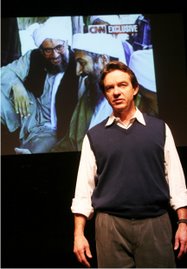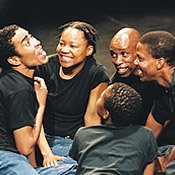“Oldboy,” Stephen Hunter wrote in The Washington Post on Friday, “must feature prominently in the discussion” of Mr. Cho’s possible motivations, “even if no one has yet confirmed that Cho saw it.” If he did, Mr. Hunter notes, “he would have passed on the subtitles and listened to it in his native language” and perhaps developed a feeling of kinship with its persecuted, paranoid hero.
WTF?
Scott goes on, in his toothless, meandering way, to down-play the role of movie violence in "inspiring" shootings like the one at Virginia Tech.
But an over-arching note of connection between movies and violence persists.
It is as if Oldboy--a wonderful retelling of The Count Of Monte Cristo by one of the world's great living directors, Chan-Woo Park--could really somehow be blamed for the actions of a single confused young man.
Oldboy, for the record, isn't about shooting schools, or shooting anyone at all. It's about revenge. (Well, and incest.) Its hero uses, among other weapons, a hammer. It's mythic, hyperbolic, beautifully made, and a little ridiculous (with intention). It is not any more violent than the Iliad, or than The Red Badge Of Courage. If the same confused young man who saw Oldboy had been born one hundred years ago, perhaps he would have frequently referenced Poe, or H. G. Wells, or Melville instead of C.-W. Park.
Many people, in fact, abuse metaphors and misappropriate symbols every day. When I say "I was as sad as Gilgamesh when my first cat, Oscar, died," I know that I was not really as sad as that mythic Babylonian king was when his best friend died. I know that the two events are only related symbolically. I am simply very sad. Did Gilgamesh "inspire" me to be sad?
Ask yourself: Did a movie about revenge make the VA Tech killer take revenge? (On whom was he taking revenge? Why?) How could a popular movie, a movie I and many of my friends have seen several times, have "inspired" anything so epic? Had it not existed, would perhaps the Iliad--a tale all about revenge, insane, civilization-breaking revenge--have "inspired" the same actions?
We walk a very slippery, stupid slope when we conflate metaphors with the things they describe. The Deconstructionists pointed this out often, and I think it's worth remembering now. Oldboy no more "inspires" violence than the Iliad, or than Teenage Mutant Ninja Turtles. Art, it has been known in all cultures throughout all times, is cathartic. It essentially fights against violence by allowing us to live the arc of anger, release, and forgiveness without actually having to, say, invade Ilium, or to defeat Shredder.
Stupid people will always misuse art for evil purposes (see Germany, the late 1930s, or listen to Fifty Cent), and other stupid people--not necessarily Mr. Scott of the Times, but many people who read his piece today--will misuse the fears of the masses against art.
Because we cannot control all the information that our children absorb every day, we must teach them to discriminate between the true and the untrue, the loving and the dangerous. We must explain why Achilles fought in the Trojan War, why we root for Donatello to dismantle Shredder's Terrordrome, and why the titular Oldboy is not a model of morality, though neither is he a totally unsympathetic murderer.
Oldboy is like all of us: He would rather not get in a fight... until he's pushed "to the limit." What pushed the VA Tech shooter past his limit, what made him feel akin to Oldboy (who, like the Count of Monte Cristo, had been truly and horribly wronged--had been given a clearer grounds for revenge than the young man who murdered his classmates), I do not pretend to know.
But I don't think we should blame--or even hint around blaming--artists Mr. Park.




No comments:
Post a Comment